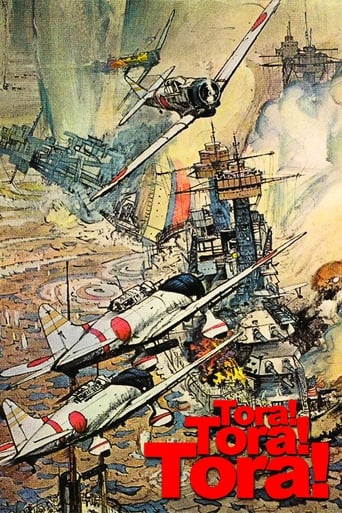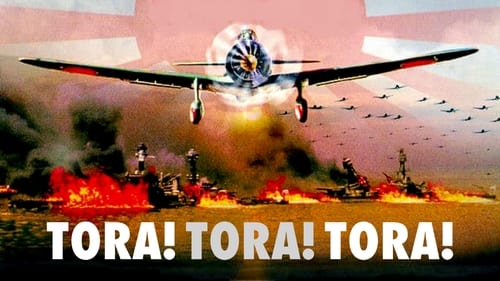



SERIOUSLY. This is what the crap Hollywood still puts out?
View MoreAn action-packed slog
A Major Disappointment
A film of deceptively outspoken contemporary relevance, this is cinema at its most alert, alarming and alive.
View MoreIf you want to get a really good feel for what took place in regards to Pearl Harbor this movie will suit you well. In addition, it is a also well done for entertainment purposes too. All my favorite movie stars and familiar faces are in this and the movie moves at a brisk pace which helps if you have a weak attention span. Notice that most the people on screen are overweight or have pot bellies and they are in the military too. There are also dated scenes but effective for their time. Landlines, old typewriters, and routines all stand-out but do not detract. I had the pleasure of seeing this in Hawaii in a huge movie theater with a large screen that was packed for the showing. I mean the movie is about Pearl and Oahu and we are there. People watched in silence and cheered in the right moments. It was a great experience. One visits with their feelings in regards to the Japanese doing what they did. To kill people without warning is similar to what terrorists do. In the movie, the Japanese Military realize the surprise attack while successful will also be used to bring people together for revenge sort of making a motivation to do so. Boy were they right about that. If you study history, you also see how the Japanese versions of war are strict and without mercy making the United States even more determined to end the war thus setting up the dropping of Atomic bombs. War is cruel. No one benefits. Innocents get hurt unjustly but when you consider who starts these aggressive acts, it puts into perspective what it takes to end these acts at all costs. Same goes for all tyrannical leaders and their beliefs. They can dish it out against the weak and the unprepared but they cannot take it when it comes back around to them. The bible comments about "calculating the costs" of anything before beginning truly wise words to this day. If men who govern and who share a planet in common cannot come to terms on how to live and share then it accuses everyone of failure in general. War is failure in the least basic terms and convicts all. Atrocities of war takes it to the lowest levels. What makes it all have a touch of insanity is that who we fought yesterday is today's friend and today's friend can be tomorrows enemy in this crazy imperfect world. Good movie to eat while watching with a tasty drink and a snack to follow. Tora Tora Tora means attack attack attack. I say it means to watch and enjoy this slice of history
View MoreHoly Mackerel! I've known of this movie forever, but got around to watching it only tonight. I started this review before I finished watching and I had already given it 10 stars.For the combat scenes, everything is thrown at the viewer as realistically as possible. There are no hokey miniatures nor restrictive sets. The destruction of a fighter during take-off is a masterpiece of practical effects. I'm trying to figure what kind of budget this movie had just for explosions. The merging of new footage of a 2-wheel touchdown and crash-landing of a bomber with real footage of the same was nearly seamless.Acting and dialog was top notch for 1970. (I'm a firm believer that both things were dramatically improved circa 1980.) Some of the dialog as a bit contrived but it was needed to push home some of the political and historical points.I gave this film a 10. It was an easy choice. "Tora! Tora! Tora!" will remain a must-see film for another generation or two. Pearl Harbor", as good as it was, lacks this film's staying power.
View MoreIt takes some courage to take an event that is such a wound to the psyche of the American people and give it an alternative perspective. This is not to accept the motivations of the Japanese Empire, but it gives a reasons for why Pearl Harbor happened. I'm hoping that contemporary society doesn't use the insipid movie "Pearl Harbor" as a benchmark for an understanding of this event. We all know that at some point, someone dropped the ball. It would have been surprising if someone had not. There were too many cooks and an arrogance that left the door open. Through some excellent research, the producers have allowed us inside the planning stages that led to the bombing. There was plenty of warning. There were just too many layers here. As this film goes along it accomplishes what every film aspires to. It makes us think we are watching actual historical figures in action, in a kind of documentary.
View MoreA largely historically accurate account of the events leading up to the attack on Pearl Harbor and the attack itself, this is a very good film but it could have been an excellent one. Made by Fox, it was an attempt to emulate the success of its previous epic World War II film "The Longest Day" but it is not on the same level. My biggest criticism of the film is that it is slowly paced. It is too long at 2 hours and 28 minutes, particularly since the attack does not begin in earnest until 1 hour and 50 minutes into the film.The first hour and a quarter of the film, give or take, is very effective as we are shown both the Japanese planning the attack and the Americans' lack of preparation for it. These scenes are filled with a great sense of tension, foreboding and a terrible inevitability. The American sequences are very well directed by Richard Fleischer - as I said in my review of "Soylent Green", a master at maintaining tension - while the Japanese ones are handled equally well by Toshio Masuda and Kinji Fukasaku. After that, however, it becomes a bit of a drag until the planes actually arrive at Pearl Harbor. I didn't really feel that I needed to see multiple scenes of said planes or the Japanese fleet in the process of travelling to Hawaii. I don't think that they really added anything to the film, to be honest. The scenes of American mismanagement and bureaucracy prior to the attack were far more necessary to the plot but they were not done as well as were the similar scenes in "A Bridge Too Far". I liked the fact that the Japanese scenes, which comprise almost half the film, are actually performed in the relevant language as it gives the film a great sense of authenticity. I had never seen in a film wholly or partly in a non-European language before so that was interesting. Although there were too many flying scenes, they were nevertheless spectacular, as were the often deeply affecting battle scenes when the attack finally began.The best performance in the film is given by Sō Yamamura as Admiral Isokoru Yamamoto, the Commander-in-Chief of the Japanese Combined Fleet. He orders a preemptive strike on the US Pacific Fleet as he believes that destroying it represents the only serious prospect for victory. Even so, he does not share the optimism of senior Army figures and politicians who long for war with the United States. He is personally opposed to the war on the grounds that it would be disastrous for Japan. The Emperor Hirohito, who is not depicted in the film presumably because he was still alive and still reigning when it was made, has no desire for war either. However, they both find themselves on the losing side of the argument. Yamamura does an excellent job of depicting Yamamoto's conflict between his loyalty to his country and the realities of sound military strategy. Since I do not know a word of Japanese other than "tora" and "sayonara," I found that I paid more attention to his facial expressions than I usually do and they played a major role in conveying that conflict. At the end of the film, Yamamoto observes, "I fear all we have done is to awaken a sleeping giant and fill him with a terrible resolve." There is no evidence to suggest that he ever actually said this but it is difficult to disagree with the sentiment.On the English speaking side, the best performance is given by Martin Balsam as Yamamoto's American counterpart Admiral Husband E. Kimmel. He is depicted in the film as a good man and a competent commander whose ability to perform was severely constrained by the incompetence of others and bureaucracy. Kimmel is under severe pressure for much of the film but manages to keep a level head throughout. Ten days after the attack, he was relieved of his command and demoted. He retired in disgrace in 1942. Played well by Jason Robards, General Walter Short is treated less sympathetically in that he is depicted as an obstinate and often short-sighted man. He is shown to be more concerned with the risk of sabotage than outside attack. In a plan that backfired drastically, he orders that the planes be positioned in the middle of airfields so that they would be safe from sabotage. Unfortunately, he might as well have painted giant bullseyes on them.The most sympathetic characters in the film are perhaps Colonel Rufus Bratton and Commander Alwyn Kramer, played by Balsam's "12 Angry Men" co-star E.G. Marshall and Wesley Addy respectively. On the night of December 6, 1941, they make a valiant effort to alert the US authorities that an attack is imminent, having learned of it from decrypted Japanese messages. However, their warnings are not taken seriously until it is too late. The film also features great performances from Joseph Cotten as Henry L. Stimson, Eijiro Tono as Admiral Nagumo, James Whitmore as Admiral Halsey, Edward Andrews as Admiral Stark, Leon Ames as Frank Knox, Neville Brand as Lt. Kaminski and Takahiro Tamura as Mitsuo Fuchida, who led the attack. Fuchida is the only major character who was still alive when the film was made. After the war, he settled in the United States. I can't imagine that he went to see the film though.Overall, this is certainly a very enjoyable film but it never reaches the level that it should. It should have been edited more tightly as it is about half an hour too long. Still, it is the best film that I have seen on the subject of Pearl Harbor.
View More